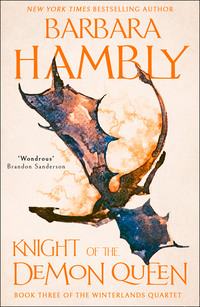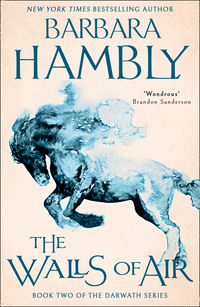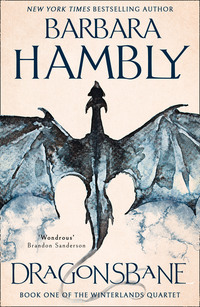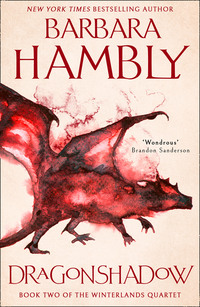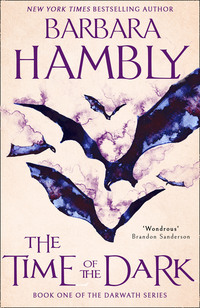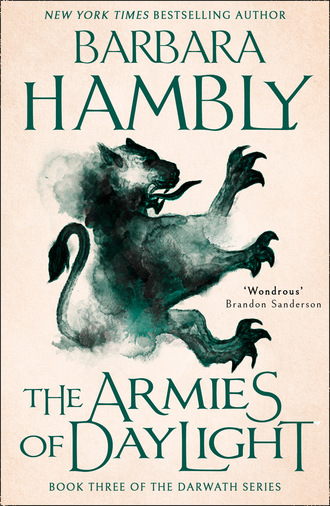
Полная версия
Blind, white semihumans fled shrieking through the fire, covering huge, rudimentary eyes against the light. Men and women in rags ran past him, screaming in terror and confusion. Walls and ceiling were bursting into flame all around him, and he remembered with sudden horror that the last cavern before the one that contained stair and rope was covered in the brown, dried moss. The knowledge was like an electrified spur. It would take only a single spark to set the whole thing off, and if he were halfway across it at the time …
The upper caverns were a choked confusion of smoke, darkness, and half-lights. He stumbled where the ground was slippery and fought against the screaming humans and almost-humans who blundered against him, grabbing at his arm, shrieking unintelligible words. Columns of smoke burned his eyes, thrashed by the winds of the Dark. Rats streamed around his feet, fleeing the inferno below.
In the last cavern, there was nothing but a wild storming of darkness. Rudy could feel the power of the Dark Ones already reaching out, damping the flames as they damped light. He felt the immense might and will that throbbed in the swirling air. Brown moss and old bones crunched under his feet. The light of the fire streamed up from the tunnels behind him, touched the limestone lace with sulfurous glory, and outlined the billows of the smoke. Black, shining bodies poured through the passage that led upward, a torrent of dripping slime and gaping mouths. They streamed like a river toward the fire in the passageway, putting out their power to quench it, to damp it. Rudy flung himself up the rockslide toward the next tunnel just as one of the hapless herd-creatures, burning and shrieking as it ran, fled blindly into the cavern, stumbled, and fell into the crumbling moss.
It seemed to Rudy, shielding his smoke-filled eyes, that the monstrous cavern, which could have swallowed the entire Keep and still had room to spare, was engulfed not so much by spreading flame as by a single explosion, so rapidly did the moss go up. He gasped at the sudden vacuum of oxygen, his head turning light and giddy. For a moment he feared he would pass out and fall backward down the rocks into the roaring hell of the fire. As he ran on, staggering, he felt the flesh of his right cheek blistered and the backs of his hands scorched by the tremendous heat. It seemed to him as if all the Dark Ones in the Nest were streaming past him over his head, putting out their magic to kill the flames, while he fled beneath them, seeking the magic rope, with the weight of his flame thrower dragging at his blistered hand.
Then he was falling, and consciousness left him.
He came to slowly, and in the dark.
He tasted rock and water and smelled slime and stone. Both his hands were empty.
With a cry of despair he sat up, and a strong hand pushed him down again. Something wet and shockingly cold smeared his burned cheek.
“Sit still,” Ingold’s voice said, not unkindly. “I believe you’ve caused quite enough trouble for one evening.”
Slowly, his dark-sight came into focus.
They were in a small stone room like a vault. Its single entrance looked out onto a tiny garden close where half a dozen apricot trees huddled like crones in a train station, heads down against the bitter cold. Above the stink of acid and the gritty taste of dust and powdered moss in his nostrils, Rudy could smell old snow mixed with dirt and the chill scent of bad weather to come. Just visible, outlined in darkness against the door, Kara of Ippit was making additional notes on one of her tablets, her halberd leaning against the wall at her side. The unscarred profile of her face was turned toward him, and Rudy decided that, if a man were in love with her, and didn’t mind cheekbones that made him think of an outcrop of granite on a desert hillside, she’d be almost pretty to him. Rudy’s pronged staff, which he had somehow kept hold of during the chaos in the Nest, was propped up nearby, its points glinting dully in what wan light managed to leak from the overcast darkness of the night sky. In a corner of the little chamber, Kta was curled up asleep, like the rag-bound mummy of an Inca child.
Rudy sighed and relaxed into the not uncomfortable bed of old leaves on which he lay. They made a tired mushing sound under the single blanket spread over them and sent up a moldery, melancholy smell. “Christ,” he whispered. “I’d hoped to hell you were all three out of the Nest before the fires got out of hand.”
Ingold smiled and went back to mixing herbed grease between his hands. In the dim, filtered light from outside, Rudy could make out a broken pot or bowl on the floor beside the wizard, half-filled with ice-cold well water that glittered faintly as it leaked down onto the rough stone floor. “If I hadn’t stopped to fight a rearguard action against the Dark,” the old man replied mildly, “I would have been in that last cavern when it exploded into flame. You didn’t see me?”
Rudy’s eyes widened with horror and guilt. “Jesus, no. I’m sorry, man …”
“I suppose I should be galvanized with delight that the cloaking-spell works so effectively … Hold still, I’m not going to brand you. It’s only burn medicine and it’s good for you. Fortunately, there was a fairly straightforward tunnel that detoured around the cavern, and I did make it out – though I had to leave the rope at the stairs.”
“How come?”
“Because I was carrying you.” He sat back, wiping his hands on the corner of Rudy’s blanket. His rough brown mantle reeked of smoke and of all the foulness of the Nest. In the shadows of his cowl, his eyes were amused and kind. “I trust your experiment with the flame thrower proved satisfactory?”
Rudy laughed shakily, and Ingold joined in – the first time, now that Rudy thought of it, that he had heard the wizard laugh in quite some time. The driven tension had faded from his eyes, leaving only an elusive, slightly haunted expression, like an echo of what he had seen in the Nest of the Dark. Rudy was later to know that look in the eyes of those who had been a part of the reconnaissance.
The memory of that putrid darkness returned to him, and he sobered. Quietly, he said, “It’s going to be rough.”
Ingold flashed him a quick, sideways glance. “You believe it can be done at all?”
Rudy frowned. “Of course. We’ll need a heavy covering force to get the flame thrower squad to the bottom of the Nest, but once we’re there, we can burn our way backward. If we can knock out the nurseries and damage as little as fifty percent of the Nest, we can make Gae safe for human habitation again.”
“And you believe that a human force can damage as much as half the Nest?”
“That moss burns like paper, man.” Rudy moved a little and winced. His muscles were already stiffening. “You don’t think so?”
The old man was silent a moment, staring down at his own cut, blistered hands. Then he glanced toward the doorway. “Kara? Are you taking the first watch?”
“If it’s all right,” she said in her queer, deep voice.
Rudy struggled to a sitting position, surprised at how sore he was. His hands and face smarted under the sticky paste of Ingold’s medicines. “I’ll arm-wrestle you for it.” he offered. “Or let’s have the three of us draw straws. Short straw has to go to sleep. God knows how Kta manages it,” he added feelingly.
“Kta’s a hundred years old,” Ingold reasoned mildly. “If there is anything he hasn’t seen, I don’t know what it could be.”
Kara’s smile was brief and hesitant, an expression that flickered out of existence almost before Rudy realized she’d been amused; it was as if at some time in her childhood she had been punished for laughing. She sat forward from the wall and put away the tablets she’d been working on, wrapping them in her old satchel. Like Gil, Rudy saw, she took her note on the wax with a sharpened hairpin, which she now carefully stuck through the lapel of her cloak, its tiny lily of diamonds twinkling like a star against the coarse gray fabric. Even the most precious jewels and trinkets were common coin among those who had survived the massacres of Gae and Karst. “Why couldn’t we just pack up and leave the city now?” she asked quietly. “I don’t think any of us is in any shape to sleep.”
Ingold lay down in the shadows next to Kta and pulled his blanket over his mantle. “No,” he decided softly. “We shouldn’t be moving about Gae at night. There are other things besides the Dark abroad. And we are all exhausted. It would be fatally easy to make mistakes. It isn’t many hours until dawn.” He turned his face to the shadows of the wall, but Rudy wasn’t going to take any bets on whether he would sleep or not.
Rudy got stiffly to his feet and drank what was left of the water in the leaky pot. It was cold and tasted of stone and of Ingold’s herbs, but he felt parched with thirst. Then he limped to the door and settled himself opposite Kara in the broken doorframe. The thought of the dreams that sleep would bring made him wonder if he were in for a lifetime of insomnia. “Scoot over,” he said. “You and me can tell each other ghost stories all night for jollies.”
Again that fugitive smile appeared, going no farther than her eyes. Wind rattled in the branches of the court trees, a thin clattering, like the dangling bones of hanged men. Little spits of rain scampered over the wet ground and stung Rudy’s burned cheek. Over the broken turrets of the city, he thought he heard a child crying again – or perhaps it was only the moaning challenge of a tomcat.
“Rudy?” Kara asked softly. “What did you see in the nurseries?”
“You didn’t see them?”
She shook her head, “I explored sideways rather than down. I never reached them.”
“Count your blessings.” Rudy pulled his old coat a little tighter about him as a tongue of wind licked at his flesh. The curly wool of the collar felt stiff against his jaw.
“Were they so horrible?”
He was silent, staring out into the darkness of the frozen court. Kara blew on her knuckles and rubbed them, her dark eyes never leaving his face. Finally he said, “You grew up in the desert.”
She nodded, “Yes.”
“You know what a tarantula-wasp is?”
“Of course,” Kara said, a little surprised at this non sequitur.
“Then don’t ask me about what I saw in the nurseries.”
He waited for a moment while she thought that one through. She made a dreadful, stifled noise in her throat and relapsed into sickened silence.
FOUR

“IT SCARCELY MATTERS when they return, my lord Chancellor,” Bishop Govannin said quietly, looking across the laced fingers of her white, bony hands. “In some ways it might be better if they never did.”
Chancellor Alwir did not turn his head; but, from where she sat on the corner of the barracks hearth, Gil could see the white gleam of the glowstones dart across his brocaded shoulders as his muscles stiffened. On the other side of the hearth, the captain of the new-formed firesquad, Melantrys, stopped in the midst of her exposition of flame throwers to a group of her fellow Guards. At the room’s long, central table, Minalde, who had been talking with the Keep’s other Bishop, the lanky, ragged leader of the Penambran refugees, turned her head sharply. Conversation in the main room of the Guards’ barracks was suddenly stilled.
Govannin continued with silky malice. “You cannot pretend that the powers that rule the Empire of Alketch will agree to lend their might to an endeavor led and counseled by wizards.”
Slowly and deliberately, Alwir regarded the prelate where she sat in the room’s single, carved armchair, with her white hands linked before her and the hearth fires dancing in the purple depths of her episcopal ring. “Ingold Inglorion, my lady,” he declared quietly, “neither leads nor counsels in this fortress. I have appointed him chief of the Wizards’ Corps, since that is where his talents lie. And I might point out to you that the Church has yet to produce either reconnaissance, protection, or weapons to aid us against the Dark.”
Govannin’s chin went up. “And of what merit is any wizard’s work against the salvation of souls?”
“You know more about the salvation of our souls than I, my lady,” Melantrys said in her low, sweet voice. “But these devices are going to be the salvation of our hides, and no mistake.” Her small, dainty hand caressed the looping rigs of wire and tubing that festooned the flame thrower’s glass bubbles. She shook back her barley-gold hair. Under soot-black, impossibly long lashes, her eyes were as pitiless as a hawk’s. Rudy had left two rifle-sized flame throwers with Melantrys, with instructions to organize the firesquad among those born with the lesser magical powers capable of wielding the weapons. The lovely captain had taken him at his word. “The troops of Alketch won’t quibble with magic on those terms,” she added.
“The ignorant won’t,” the Bishop replied softly. “The godless won’t. But ignorant and godless warriors march in all armies. Sometimes they even command them.”
Alwir swung around, bristling, and met only that close-lipped, reptilian smile. With determined cheerfulness, he said, “Surely it would be flying in the face of providence to reject weapons that have come down to us, miraculously preserved, from the Times Before. Exactly how Dare of Renweth’s forces defeated the Dark Ones and drove them back underground is a secret regrettably lost to us, for the last scion of his House is an infant, and Tir’s father perished in the ruins of Gae. But I am convinced that Dare used weaponry of this kind – and as such, he must have had a trained corps of firebringers to wield them. Their success may be gauged by the centuries of respite humankind had from the Dark.”
The Bishop’s ivory fingers flicked. “Wizards’ work,” she snorted disdainfully. “Work that fouls the hands of any who touch it, your precious Dare of Renweth along with the rest.” She cast a scornful glance across at Bektis, who sat with the amber colors of the hearth fire gleaming in the white silk of his beard, gravely examining a second flame thrower at the other end of the table. In the middle of the table, the Guards’ Commander Janus and the handful of poker players around him were keeping a wary eye on which way the muzzle was pointing.
Alwir’s smile remained resolutely pinned to his mouth. “I think we have heard enough of wizards for one evening, my lady Bishop.”
“You will hear enough and more than enough when the representatives of the Lord of Alketch arrive.” Her bitter eyes were like starlight on oily black water. “The Emperor of Alketch is a man of true faith.”
“He’s a priest-ridden bigot who had his own first wife burned for a witch,” the Penambran Bishop snapped, looking up from the misshapen knot of his crippled hands.
Govannin’s lip curled. “The fact remains, Maia of Thran,” she said, rolling the peasant form of his surname from her tongue with all the scorn of a descendant of the most ancient of noble Houses, “that in the South, where the Straight Faith is strong and unpolluted, there are no Dark Ones. Only in the North and in the plains where the heathen Raiders roam have the Dark Ones risen to scourge humankind.”
“According to Stiarth of Alketch,” Janus said. He spoke the name of the Imperial Ambassador as if it were wormwood in his mouth.
“Do you doubt him?” Govannin purred.
As Commander, Janus could say nothing, but Melantrys opened her mouth, and Alwir’s rich voice cut across her possibly unseemly reply.
“Of course not. There is an air about a man whose world has collapsed in ruins about him. You know it; you have all seen it. That, if nothing else, should have spoken to you all.” The Chancellor turned to survey them, haughty eyes challenging any of those ragged warriors in their frayed surcoats to deny what they all knew in their hearts. “He was clad richly and fed well – too richly and too well for a man whose world is a ruin. No,” Alwir went on, “whether it was by virtue of God’s will, or the Emperor’s merit, or purest chance and the fate of mankind, there are no Dark Ones in Alketch. We would be fools if we did not mold our policies accordingly.”
There was a murmuring, unrestful and wary. Melantrys folded her arms over the clumsy length of the weapon in her lap; Minalde, her mouth set at the memory of her battles with her brother over the preliminary negotiations with the Emperor’s Ambassador, looked down at her fingertips. Govannin settled back in her chair and tented her fingers again before her, an unpleasant glitter in her narrow eyes.
Alwir continued. “We have sent word to all the landchiefs of the Realm: to Harl Kinghead in the North and Tomec Tirkenson in Gettlesand; to Degedna Marina and her vassals in the Yellow River Country in the East. From none of them have we received a reply. The hand of the Dark lies heavy over the Realm. It may be that none will stir to fight. I have heard that the greatest of the landchiefs, the Prince of Dele, is dead; the others may have set themselves up as independent kinglets, each ruling from his own pitiful fortress, in spite of the vows he made to the High King of Gae.
“Therefore, we must work with our allies of Alketch and hold in check our prejudices and whatever grudges we may have formed in the past.” As if by chance, that chill, jewel-blue gaze touched the gaunt form of the Bishop of Penambra, who raised smoldering eyes in return. “We need that alliance,” the Chancellor continued grimly. “We need it, as a wounded limb needs a healthy body for its rejuvenation. The Empire of the South has all those things that we now lack – trade and commerce, education, arts, culture, the wherewithal to forge steel weapons, and the civilization to enforce laws.”
“Aye,” Janus murmured, leaning his great, red-furred forearms on the table. “But whose laws?”
In the momentary silence, Alwir’s face seemed to harden in the cross-grained shadows of the scattered glowstones and the leaping redness of the hearth.
Govannin said, “Written laws, my muscular friend. The sort that my lord Alwir has sought from the beginning to purge from the records.”
“The useless quibblings of Church legalists whose bones rot in the streets of Gae!” The Church records were a sore point with Alwir. “I swear by the ice in the north, woman, the paper they’re written on is of more use!”
“To write your own laws upon?”
“To keep census and records of the Keep!” he shouted, losing his temper. He made a move toward her, goaded past endurance, but then he saw her smile and struggled to master himself.
In the shadows of the guardroom, no one moved or spoke. Only Gnift the swordmaster slapped a greasy card on the table and crooned, “And eight lovely hearts for the charming lady in black.”
Alwir took a deep breath, his mouth clamping beneath flared nostrils. “I tell you, my lady Bishop – and I tell all of you – that, of all things, this alliance with Alketch is of the greatest importance to the Keep and to everyone within its walls. Without it, we lose our last hope of civilized existence. We will become degenerate villagers, ignorant and brutal, prey to the stronger and the better-armed. And that I will never permit.” His eye touched them all: Melantrys, her delicate nostrils flared as if against the stink of Ambassador Stiarth’s perfumes; Alde, still looking down at her hands in angry silence; the Bishop of Penambra in his patched red cloak and scavenged brocades. “I will let nothing interfere with it. Believe me, there is nothing – and no one – that I would not sacrifice to bring about a lasting alliance with the Empire.”
“Including yourself, my lord?” a new voice inquired, a flawed, mellow voice that spoke from the dense shadows of the barracks door. Gil looked up at the sound of it, warmth kindling in all her veins.
Alwir swung around, recognizing, as they all did, that shabby form in the darkness. “So you’ve returned,” he said.
The firelight glittered on flecks of sleet that clung to Ingold’s stained mantle. As he stepped into the light of the room and pushed back his hood, Gil was shocked at how old he looked. Behind him, Rudy and Kara emerged from the darkness and they, too, were mud-splattered and silent, weary past caring about anything. Gil saw Alde look up and Rudy turn his face away, as if he could not bear to meet the joy that shone in her eyes.
“Did you think I would not return, my lord?” Ingold set down the satchel that he carried. From within it, Gil heard the faint click of wax tablets. Janus was already on his feet, his shadow blotting the light of the hearth as he bent to pour a cup of so-called guardroom wine from the small kettle that was warming beside the fire.
“No,” Alwir said at last. “No, you have shown yourself proof against most calamities, my lord wizard.”
“Or able to avoid them,” Govannin remarked acidly.
“It is the secret of my indecently long life,” Ingold agreed with a small smile. “Thank you, Janus – this is the other secret of my indecently long life.” He sipped the steaming liquid, which was not wine at all, but a horrible compound of hot water and homemade gin.
The Commander of the Guards steered him to a seat on one of the rough benches at the table, and Alde moved her heavy skirts aside so that he might sit. Rudy and Kara took seats on the raised brick hearth beside Melantrys, their thawing garments steaming and dripping unnoticed in the heat. Where Kta had vanished to, none of them could have said, but he was found later, peaceably warming his skinny hands by the kitchen fire in the Wizards’ Corps complex, eschewing the councils of the mighty.
“My lord,” Ingold said at length, “are you still set upon this invasion?”
The Chancellor’s voice was brisk, but there was an edge of wariness in it. “Of course I am still set upon it,” he said. “Can it be done?”
The wizard’s eyes glinted in their discolored hollows. “Rudy believes that it can.”
“Indeed?” Alwir’s eyebrows quirked. “And I collect you hold a different opinion, my lord wizard?”
“It is folly,” Ingold said simply.
The Chancellor’s thin smile broadened, without increasing its warmth by a single degree. “Well,” he murmured, “fortunately for us all, you are no longer the sole source of information on the subject, are you? Was it folly that enabled Dare of Renweth to defeat the Dark?”
Ingold made no reply to this baiting. With a sneer, Alwir turned away. “Rudy? Are those magical devices of yours the answer to this riddle, after all?”
Rudy looked up, as if startled out of some private, terrible dream. “I don’t know whether they were Dare’s solution to the problem or not,” he said in a voice thick with fatigue. “But we can damage the Nest badly, maybe so badly they’d have to abandon it completely.”
And haltingly, half-numbed with exhaustion, he told them of what he had found in the Nest – the vast complexity of that dark and filthy realm, the ability of the Dark Ones to damp light or fire, and the curiously flammable properties of the dried, leprous brown moss.
“That will be our strength,” he concluded. “If we sent a strike force down each of the two main branches of the Nest, to cover the firesquad as far down as the nurseries, the fires would spread in the moss as the army retreated. I think that would do it.”
“Especially if the mosses themselves are the nitrogen fixers for the whole ecosystem of the Nests,” Gil added unexpectedly. “If that’s so – and that’s what it sounds like – the whole Nest must be saturated with nitrogen compounds.”
Everyone in the guardroom, Rudy included, stared at her with as little comprehension as if she had spoken Etruscan. Tardily reminding herself that she was dealing with a preindustrial worldview, Gil amended, “My studies have shown that this type of moss can be very flammable.”
“Indeed,” Alwir said thoughtfully. “I had no idea you were a scholar, Gil-Shalos. A curious pastime for a soldier. That is two of your students, my lord Ingold, who disagree with your findings.”
He turned back to Rudy. “So you think that, with men to guard the firesquad from the Dark and perhaps the wizards to surround the whole force in an aura of light, it would be feasible to burn out the Nest in the fashion you describe?”


